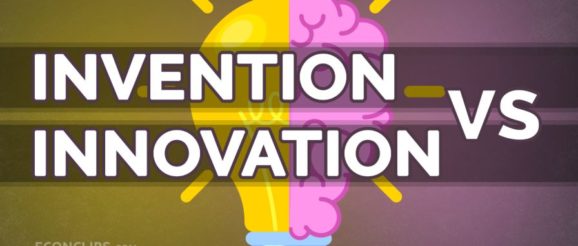What’s the difference between invention and innovation? – Econ Clips

Not every invention changes the world, and certainly not every one does it immediately or through the actions of the inventor himself. It is not the fault of fate or immaturity of society unable to appreciate the inventor’s genius. In order for the invention to become a breakthrough and to change the lives of the masses – it must become an innovation.
Innovation is an invention implemented and used on a large scale.
The first wheel (and axle) could have been the most brilliant invention of the world at that time – but it did not change the fate of others or improve the quality of life of the people of that era, until the inventor presented his novelty, explained its meaning and applications and showed that it could be used for faster and easier transport.
Gutenberg’s printing press would not matter at all if it were not adopted by others and if it soon did not become widely used to print writings, including the Holy Bible translated into national languages.
The Newcomen’s steam engine would be forgotten and would only exist as a record in a dusty work of some historian if in 1712 the Staffordshire mine did not run the first of these machines to accelerate and facilitate coal mining – which proved in practice the efficiency of the machine in the mining industry.
Similarly, the same engine could never become a key element of the industrial revolution, were it not for the subsequent improvements and mass sales that we owe to James Watt.
Innovation is an invention that has been successfully presented to the masses and sold on the market. The inventor is (of course!) the father of the invention – but entrepreneurs are the father of innovation. Sometimes it is one and the same person – history knows many inventor-entrepreneurs, such as Thomas Alva Edison. However, the author of the spectacular success of a given technological novelty is often someone else entirely than the inventor himself. This is not surprising – after all, not every scientist or engineer must be also a businessman and a specialist in advertising, promotion and sales.
In society, everyone acts on the basis of his or her best judgment, engages in voluntary interactions with others, and has a chance to profit from it. The one who best meets the needs of a wide range of consumers gains the most – but, nevertheless, everyone gains: the inventor, the entrepreneur, the “multiplier” of a given invention and finally the final recipient of the product: the consumer.
Back to the example of China: why the industrial revolution and the radical increase in prosperity and improvement of society’s living conditions started not in China, but in Great Britain and the USA, and not before the mid-eighteenth century? It might seem that China had everything a country needs for a breakthrough: inventions, huge population, large surface area, lots of natural resources. However, for an invention to become an innovation and to actually change people’s lives, something else is needed: well-functioning market institutions and people who can make use of them: the entrepreneurs.
This new group of people took up (and continue to this day) the fight against uncertainty. What does it mean? Entrepreneurs try to anticipate the what, when and whys that will be needed for as many people as possible, and then to provide them with these goods and services in the best and cheapest way possible. They take this uncertainty on their shoulders: if their predictions prove to be correct, they have a chance to make a profit; if they are wrong they will suffer a loss.
What does this mean for the story of two Steves arguing over an apple? Are we really dealing with the story of a poor inventor: a genius used by a bloodthirsty entrepreneur? Maybe the creator of Apple’s breakthrough technology was not Steve Jobs, but Steve Wozniak. However, without the entrepreneurial skills, business intuition and market sense that characterized Jobs, Apple Inc. could not be so successful, and Apple I and Apple II could have ended up as interesting, but forgotten inventions, lying in the dust of some abandoned garage.
